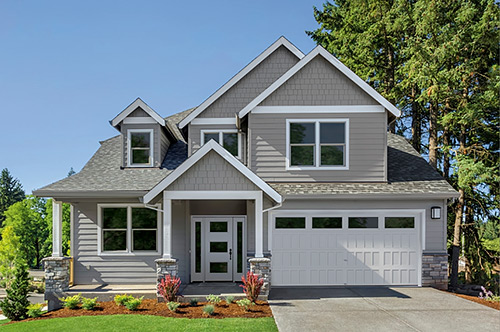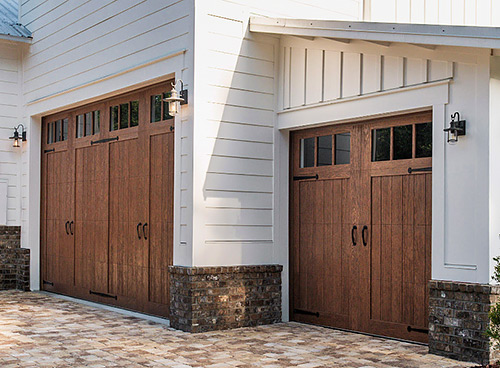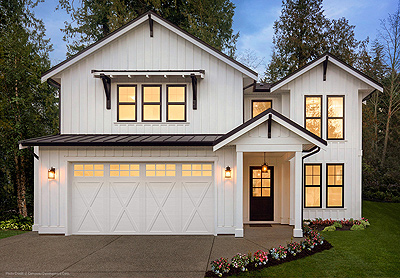
.png)
Search By Square Foot
• Up to 1000 Sq Ft
• 1001 - 1500 Sq Ft
• 1501 - 2000 Sq Ft
• 2001 - 2500 Sq Ft
• 2501 - 3000 Sq Ft
• 3001 - 3500 Sq Ft
• 3501 - 4000 Sq Ft
• 4001 - 4500 Sq Ft
• 4501 - 5000 Sq Ft
• 5001 Sq Ft And Up
Search By Square Foot
• Up to 1000 Sq Ft
• 1001 - 1500 Sq Ft
• 1501 - 2000 Sq Ft
• 2001 - 2500 Sq Ft
• 2501 - 3000 Sq Ft
• 3001 - 3500 Sq Ft
• 3501 - 4000 Sq Ft
• 4001 - 4500 Sq Ft
• 4501 - 5000 Sq Ft
• 5001 Sq Ft And Up
by Rachel Lyon, Editorial Director for The House Designers®
To have an efficient home, it must be properly insulated. Insulation in the walls, floors, and roof helps keep the interior comfortable through the seasons. It also saves money because it reduces how much the HVAC system has to work to maintain a comfortable temperature. But what about the garage? Technically counted as an exterior feature that can be skipped when it comes to insulation, the garage would be easy to overlook. Here’s why an efficient garage door with insulation makes a great choice for a few reasons!

Better Efficiency
An efficient garage door includes a layer of insulation that slows heat transfer between the interior and exterior. This means it can help maintain the temperature in the garage, so entering it from the house does not feel like stepping straight outside. Insulation comes in a variety of material types and thicknesses, so be sure to compare R-values. Higher R-values offer better thermal protection, so the temperature inside the garage will be more comfortable. The difference can be substantial—like 10 to 20 oF warmer in the winter and cooler in the summer than outside.
How does an efficient garage door benefit you in practical terms? Consider what you have in your garage. You can reduce the need to warm up your car in the winter if it's parked somewhere warmer, and that will save fuel in the long run. Some homes place the furnace, water heater, or other appliances that are not made for extreme temperatures in the garage, and you may also spend time in there if you have a workshop or hobby space. An insulated garage door will help keep a more consistent temperature—that means better conditions for people and machines alike. And if you're in the garage often, think about adding some insulated windows that allow natural light inside so you can cut down on lighting costs while boosting curb appeal, too!

Quieter Opening & Closing
If you’ve ever thought that garage doors are noisy, you’ll be happy to know that you can make them quieter with good maintenance and by investing in insulation. Some parts of garage doors shake and rattle as they go up and down—adding insulation between the outside surface and the interior skin of a door makes it stronger and sturdier, which decreases the sound when it moves. Denser types of insulation, like polyurethane foam, are the best choice if you want garage doors that operate more quietly.
Consider the layout of your home to decide how important a quieter garage door is for your household. If you have bedrooms next to or above the garage, that layer of insulation will make a big difference. Even if the garage opens into communal spaces, sound can travel. Most homeowners who purchase efficient garage doors do so for the thermal insulation, but they also appreciate the noise reduction that goes along with it.

Improved Durability
The most basic garage door is composed of a single layer of steel. If you want more substantial construction, insulation is the answer. A layer of insulation is usually 1-3/8” to 2" thick and provides a good base for steel skins, wood, and composite overlays and cladding. By sandwiching it between the two skins, you can greatly improve the durability of the door and invest in its long-term beauty. Doors that include insulation are much thicker and less likely to be damaged than their single-layer, un-insulated counterparts.
If you’re looking for an insulated garage door that offers better energy efficiency, quieter operation, and improved durability, check out the wide range of options available from Clopay®. Find a local dealer who can help you decide on the best solution for your needs!